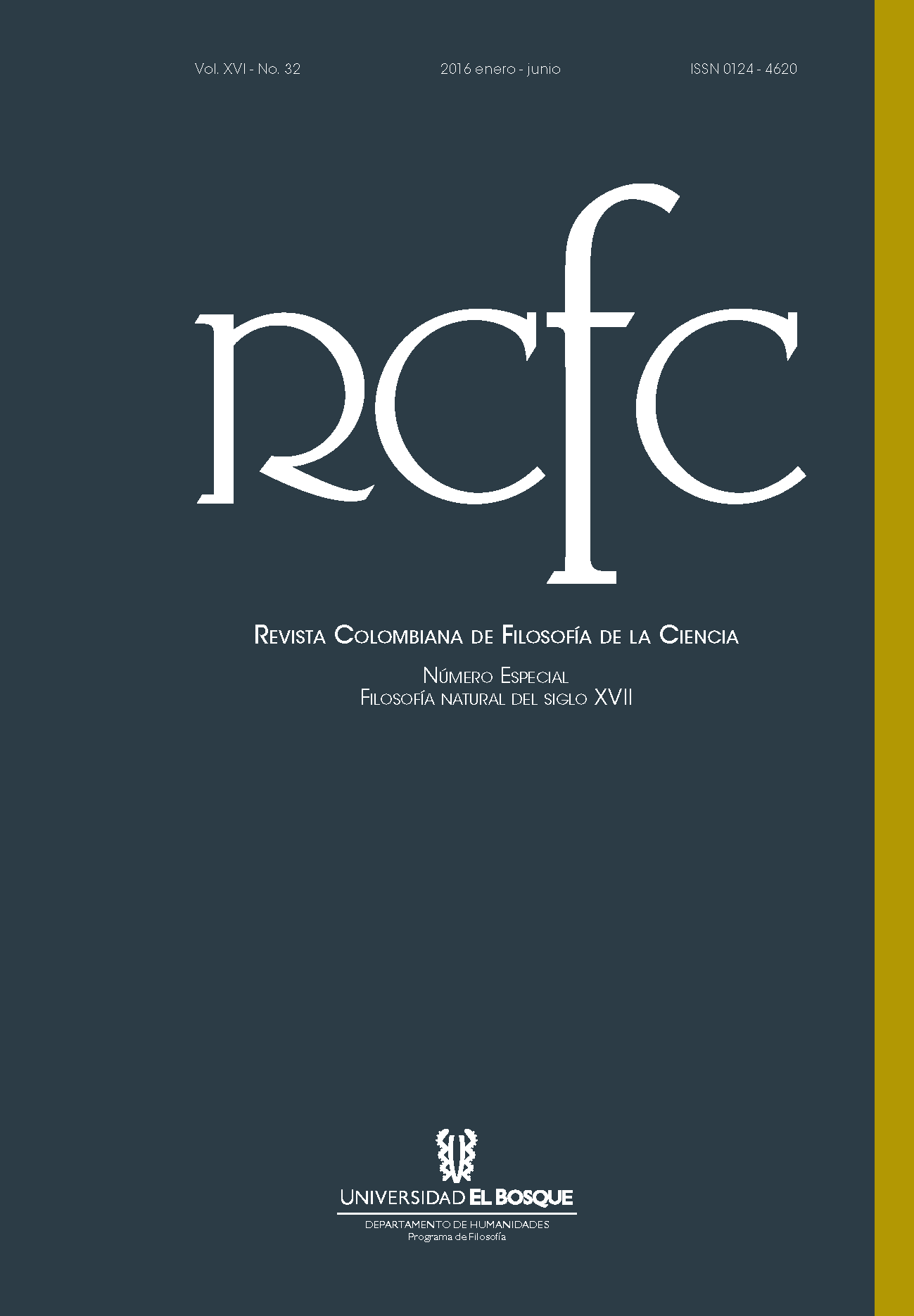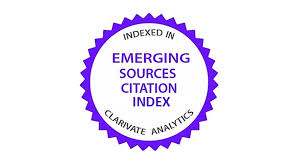Sobre el concepto de leyes de la naturaleza en Isaac Newton
DOI:
https://doi.org/10.18270/rcfc.v16i32.1827Palabras clave:
Isaac Newton, Leyes naturales, Filosofía natural, Filosofía de la ciencia, Siglo XVIIResumen
El propósito de este artículo es, de un lado, esclarecer los usos por parte de Newton del concepto de Ley Natural (LN), a la luz de los problemas y tradiciones disponibles para él –principalmente, del cartesianismo, las filosofías experimentales inglesas y las tradiciones mágicas y alquímicas– y, de otro lado, señalar las transformaciones que realiza sobre este concepto de raíz cartesiana en sus dos principales obras –los Principia y la Opticks. Como conclusión de lo anterior, mostraré que este concepto de LN permite afirmar como una “cuestión de hecho” la existencia de las entidades postuladas en las LN, aunque se desconozcan sus propiedades o cualidades o incluso su causa. Aspectos importantes de este concepto de LN se identifican tradicionalmente como legado de la revolución científica y, por tanto, su aplicación retrospectiva a Galileo, Kepler o Boyle, entre otros, constituye una clara indicación del anacronismo que resulta de la carencia de estudios históricos sobre el concepto de LN; su esclarecimiento permite, de otro lado, arrojar luces sobre la expansión y desarrollo del newtonianismo en el siglo XVIII.
Descargas
Referencias bibliográficas
Alexander, H. G. The Leibniz-Clarke Correspondence Together with Extracts from Newton's Principia and Opticks. Manchester: Manchester University Press, 1956.
Bacon, Francis, Graham Rees y Maria Wakely. The Instauratio Magna: Part 2. Oxford: Clarendon Press, 2004.
Brewster, David. The Life of Sir Isaac Newton. London: J. Murray, 1831.
Cohen, I. B. The Newtonian Revolution: With Illustrations of the Transformation of Scientific Ideas. Cambridge: Cambridge University Press, 1980.
Daston, Lorraine y Michael Stolleis. Natural Law and Laws of Nature in Early Modern Europe: Jurisprudence, Theology, Moral and Natural Philosophy. Farnham, England: Ashgate Pub. Co., 2008.
Descartes, René, Charles Adam y Paul Tannery. Œuvres de Descartes. Paris: J. Vrin, 1964.
Descartes, René, David E. Smith y Marcia L. Latham. The Geometry of René Descartes: [with a Facsimile of the First Edition]. New York: Dover Publications, 1954.
De Morgan, Augustus. “Review of Sir David Brewster’s Life of Newton”. The North British Review (1855): 307-38.
Domski, Mary. “Putting the Pieces Back Together Again: Reading Newton’s Principia through Newton’s Methos”. Hopos: The Journal of the International Society for the History of Philosophy of Science 3.2 (2013): 318-33.
Ducheyne, Steffen. The Main Business of Natural Philosophy: Isaac Newton's Natural-Philosophical Methodology. Dordrecht: Springer, 2012.
Euclides. Elementos: Libros X-XIII. Madrid: Gredos, 1996.
Force, James E. y Richard H. Popkin. Essays on the Context, Nature, and Influence of Isaac Newton's Theology. Dordrecht: Kluwer Academic Publishers, 1990.
Funkenstein, Amos. Theology and the Scientific Imagination from the Middle Ages to the Seventeenth Century. Princeton, N.J: Princeton University Press, 1986.
Guerlac, Henry. “Newton and the Method of Analysis”. Dictionary of the History of Ideas. Ed. Philip P. Wiener. New York: Scribner. 3 (1973): 378-91.
Guicciardini, Niccolò. Isaac Newton on Mathematical Certainty and Method. The MIT Press, 2009.
Hall, Alfred Rupert. Philosophers at War: The Quarrel between Newton and Leibniz. Cambridge: Cambridge University Press, 1980.
Hall, Alfred Rupert y Marie B. Hall. Unpublished Scientific Papers of Isaac Newton: A Selection from the Portsmouth Collection in the University Library, Cambridge. Cambridge: University Press, 1962.
Harrison, Peter. “The Development of the Concept of Laws of Nature”. Creation: Law and Probability. Ed. Fraser Watts. Minneapolis: Fortress Press, 2008. 13-36.
_____. “Was Newton a Voluntarist?” Newton and Newtonianism. Ed. James E. Force y Sara Hutton. Dordrecht: Kluwer Academic Publishers, 2004. 39-63.
Henry, John. “Voluntarist Theology at the Origins of Modern Science: A Response to Peter Harrison”. History of Science xlvii (2009): 79-113.
_____. “The Fragmentation of Renaissance Occultism and the Decline of Magic”. History of Science xlvi (2008): 1-48.
_____. “Metaphysics and the Origins of Modern Science: Descartes and the Importance of Laws of Nature”. Early Science and Medicine 9.2 (2004): 73-114.
_____. “Occult Qualities and the Experimental Philosophy: Active Principles in pre-Newtonian Theory of Matter”. History of Science xxiv (1986): 335-81.
Herivel, John. The Background to Newton's Principia: A Study of Newton's Dynamical Researches in the Years 1664-84. Oxford: Clarendon Press, 1965.
Higgitt, Rebekah. Recreating Newton: Newtonian Biography and the Making of Nineteenth-Century History of Science. London: Pickering & Chatto, 2007.
Hobbes, Thomas y Howard Warrender. De Cive: The Latin Version Entitled in the First Edition Elementorum Philosophiæ Sectio Tertia De Cive, and in Later Editions Elementa Philosophica De Cive. Oxford: Clarendon Press, 1983.
Hooke, Robert y R. T. Gunther. Micrographia, Or, Some Physiological Descriptions of Minute Bodies Made by Magnifying Glasses: With Observations and Inquiries Thereupon. New York: Dover Publications, 1961.
Jacob, Margaret C. The Newtonians and the English Revolution, 1689-1720. Ithaca, N.Y: Cornell University Press, 1976.
Jesseph, Douglas M. Squaring the Circle: The War between Hobbes and Wallis. Chicago, IL: University of Chicago Press, 1999.
Mahoney, Michael. “The Mathematical Realm of Nature”. The Cambridge History of Seventeenth-century Philosophy. Ed Michael Ayers y Daniel Garber. Cambridge: Cambridge University Press, 1998. 702-55.
Mancosu, Paolo. Philosophy of Mathematics and Mathematical Practice in the Seventeenth Century. New York: Oxford University Press, 1996.
Manzo, Silvia. Entre el atomismo y la alquimia. La teoría de la materia de Francis Bacon. Buenos Aires: Biblos, 2006.
_____. “Leyes de la naturaleza y ciencia del siglo XVII”. Ciencia, matemática y realidad. Estudios de historia de la ciencia. Ed. Pablo Melogno. Montevideo: Universidad de La República (en prensa).
Molina, Sebastián. “La metodología de Newton y la demostración de la realidad de la fuerza”. Estudios de Filosofía 50 (2014): 131-54.
Newton, Isaac. Opticks: Or, a Treatise of the Reflections, Refractions, Inflections & Colours of Light. Based on the 4th ed. London, 1730. New York: Dover Publications, 1952.
_____. “An Hypothesis Explaining the Properties of Light”. The History of The Royal Society. Ed. Thomas Birch. Vol. 3. London: A. Millar in the Strand, 1757. 247-305.
Newton, Isaac, Alexandre Koyré e I. B. Cohen. Philosophiae Naturalis Principia Mathematica. Cambridge, Mass.: Harvard University Press, 1972.
Newton, Isaac y Alan E. Shapiro. Optical Papers. The Optical Lectures 1670-1672. Cambridge: Cambridge University Press, 1984.
Newton, Isaac y D. T. Whiteside. The Mathematical Papers of Isaac Newton. Cambridge: Cambridge University Press, 1967.
Oackley, Francis. “Christian theology and the Newtonian science: The Rise of the Concept of the Laws of Nature”. Church History 30 (1961): 433-57.
Orozco-Echeverri, S. H. “De la existencia a la providencia: el argumento del diseño en Isaac Newton”. Ciencia y religión. Reflexiones en torno a una racionalidad incluyente. Eds. L. M. Duque y L. M. Estrada. Cali: Universidad del Valle, 2013. 87-110.
_____. Isaac Newton y la reconstitución del palimpsesto divino. Medellín: Editorial Universidad de Antioquia, 2009.
Pappus. Mathematicæ Collectiones à Federico Commandino Urbinate in Latinum Conversæ, et Commentariis Illustratæ. Pesaro, Italia: Girolamo Concordia, 1588.
Pérez-Ramos, Antonio. Francis Bacon's Idea of Science and the Maker's Knowledge Tradition. Oxford, England: Clarendon Press, 1988.
Pycior, Helena M. Symbols, Impossible Numbers, and Geometric Entanglements: British Algebra Through the Commentaries on Newton's Universal Arithmetick. Cambridge, U.K: Cambridge University Press, 1997.
Rossi, Paolo. Francis Bacon: from Magic to Science. Chicago: University of Chicago Press, 1968.
Roux, Sophie. “Les lois de la nature à l’âge classique: la question términologique”. Revue de synthèse 4.2-3-4 (2001): 531-76.
Ruby, Jane E. “The Origins of Scientific ‘Lawʼ ”. Journal of the History of Ideas 47.3 (1986): 341-59.
Shapiro, Alan E. Fits, Passions, and Paroxysms: Physics, Method, and Chemistry and Newton's Theories of Colored Bodies and Fits of Easy Reflection. Cambridge: Cambridge University Press, 1993.
Snobelen, Stephen. “To Discourse of God: Isaac Newton’s Heterodox Theology and his Natural Philosophy”. Science and dissent in England, 1688-1945. Ed. Paul B. Wood. Aldershot, Hampshire: Ashgate, 2004. 39-65.
Steinle, Friedrich. “The Amalgamation of a Concept. Laws of Nature in the New Sciences”. Laws of nature. Essays on the Philosophical, Scientific, and Historical Dimensions. Ed. Friedel Weinert. Berlin: De Gruyter, 1995. 316-68.
Watkins, Eric. The Divine Order, the Human Order, and the Order of Nature: Historical Perspectives. Oxford: Oxford University Press, 2013.
Westfall, Richard S. Never at Rest: A Biography of Isaac Newton. Cambridge: Cambridge University Press, 1980.

Descargas
Publicado
Cómo citar
Número
Sección
Licencia
Derechos de autor 2016 Revista Colombiana de Filosofía de la Ciencia

Esta obra está bajo una licencia internacional Creative Commons Atribución-NoComercial-SinDerivadas 4.0.










